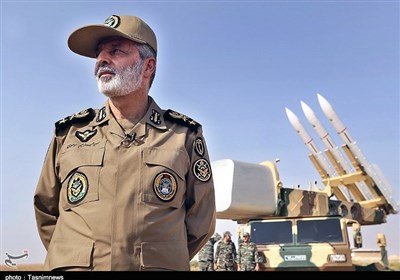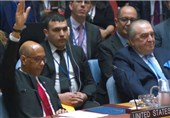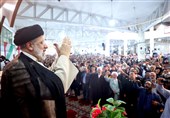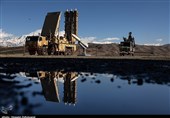US Withdrawal from INF Heightens Danger of Nuclear Apocalypse: Nobel Nominee
TEHRAN (Tasnim) – A prominent American author and five-time Nobel Peace Prize nominee described the Trump administration as “lawless” and said the US move to pull out of the Intermediate-range Nuclear Forces (INF) Treaty “heightens the danger of nuclear apocalypse”.
“Of course, this (the illegal withdrawal from the INF) heightens the danger of nuclear apocalypse, as does the White House's illegal effort to transfer nuclear technology to Saudi Arabia without Congressional approval, which is required, and which it will not get because Saudi Arabia not only does not commit to best practices but openly threatens to build nukes,” David Swanson, who is based in Virginia, said in an interview with Tasnim.
“Some US nukes are 1,000 times what was used to vaporize Japanese populations,” he said, adding, “Each submarine can launch 5,000 times what was dropped on Hiroshima. This issue is not secondary, minor, or peripheral. Wake up, people!”
David Swanson is an author, activist, journalist, and radio host. He is executive director of WorldBeyondWar.org and campaign coordinator for RootsAction.org. Swanson’s books include War Is A Lie and When the World Outlawed War. He blogs at DavidSwanson.org and WarIsACrime.org. He hosts Talk Nation Radio. He is a 2015, 2016, 2017, 2018, 2019 Nobel Peace Prize Nominee. Swanson was awarded the 2018 Peace Prize by the US Peace Memorial Foundation.
Tasnim: The US on Friday formally withdrew from the Intermediate-range Nuclear Forces (INF) Treaty with Russia. Washington said last year it would withdraw from the INF, accusing Russia of failing to comply with it. Moscow denies it has violated the treaty and says the Trump administration is pulling out because it wants to pursue a new arms race. UN Secretary-General Antonio Guterres also expressed concerns over the expiration of the INF, saying, “The world will lose an invaluable brake on nuclear war”. “This will likely heighten, not reduce, the threat posed by ballistic missiles,” he said. What is your assessment of the developments? How do you think about the US claims?
Swanson: My understanding from the analysis by Timmon Wallis is that allegations like those of the US toward Russia are to be dealt with through the terms of the treaty and that to end the treaty requires an extraordinary event of a sort that has not occurred. Moreover, it was the United States who insisted on the treaty being that difficult to legally exit. Now the United States has illegally exited it. Under the US Constitution, a treaty is the supreme law of the land and cannot be violated. Were this a treaty that a party could simply withdraw from (which it isn't), the party doing the withdrawing would have to include the US Congress. The US House of Representatives’ version of the National Defense Authorization Act includes a provision forbidding the US to violate the treaty (whether or not Trump claims to have withdrawn from it), but that still has to get passed the Senate and the President and then be complied with by a lawless administration that the Congressional leadership has essentially promised not to impeach no matter what. Of course, this heightens the danger of nuclear apocalypse, as does the White House's illegal effort to transfer nuclear technology to Saudi Arabia without Congressional approval, which is required, and which it will not get because Saudi Arabia not only does not commit to best practices but openly threatens to build nukes.
Tasnim: The US president has said he wants a new nuclear pact to be signed by both Russia and China. Do you think that countries like China would join the nuclear treaty that Trump is seeking to reach?
Swanson: Would you? What would be the point of ratifying a treaty with a partner that violates treaties at its whim? The new pact that every nation needs to join is the new treaty banning all nuclear weapons.
Tasnim: With the expiration of the treaty, do not you think that the world order would be disrupted? In that case, who would be to blame?
Swanson: Every nuclear government, beginning with the US. Every nuclear profiteer. Every government that has not ratified the nuclear ban. And every person who is not engaged in the struggle to ban nuclear weapons. This week, 74 years ago, the cities of Hiroshima and Nagasaki were each hit with a single nuclear bomb that had the power of a third to a half of what NPR calls a low-yield or "usable" weapon. By NPR, I mean both the Nuclear Posture Review and National Public Radio, both the US government and what many people dangerously think of as a free press. These so-called usable nukes are two to three times the size of what destroyed Hiroshima and Nagasaki, and the US military's plans involve using multiple nukes at once. But they really are tiny compared to other nuclear weapons that the United States and other nations have ready just in case some unfortunate scenario makes completely annihilating ours and other species the wisest course of action. Some US nukes are 1,000 times what was used to vaporize Japanese populations. Each submarine can launch 5,000 times what was dropped on Hiroshima. This issue is not secondary, minor, or peripheral. Wake up, people!






